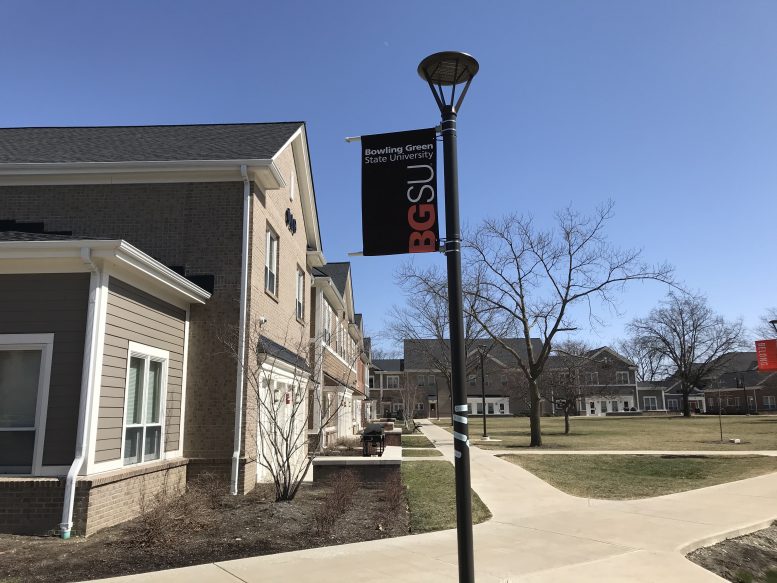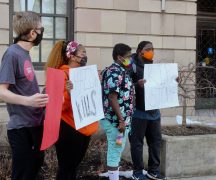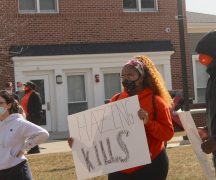By DAVID DUPONT
BG Independent News
Fraternities and sororities at Bowling Green State University will face increased scrutiny as the new semester begins.
The death last March of sophomore Stone Foltz has brought increased attention to the issue of hazing in Greek organizations both at BGSU and across the state.
Collin’s Law, a bill prompted by the death in November, 2018 of Collin Wiant at Ohio University, passed the legislature and was signed by the governor. The state Inter-University Council issued an extensive package of recommendations.
BGSU officials, who were involved in both efforts, have come up with new procedures to make these anti-hazing initiative a reality.
Brian Heilmeier, director of student engagement, said this is “definitely the biggest push” he’s seen to address hazing.
The byword is zero tolerance for hazing. It applies not just for the violent and most dangerous forms that make headlines, but the subtle forms as well. That may involve telling pledges they must dress a certain way, requiring them to behave in a certain manner while on campus, and having them do the small favors for members. Anything that calls attention to the new member and causes humiliation, said Provost Joe Whitehead.
Much of this is passed down in the name of tradition, and made possible by the members of the chapter having power they exercise over those who want to join them.
“Left unchecked subtle hazing can lead to harassing hazing can lead to violent hazing,” Heilmeier said.
An allegation of hazing will prompt an investigation and if well founded a disciplinary process. Only then would sanctions be levied if warranted. “We have to have due process,” Whitehead said. “We’re actually looking at that process. What can we do to facilitate doing things more quickly and more efficiently?”
The key, Whitehead said, is “education, education, education.”
The university has had a training day for presidents, Heilmeier said. Now that training will be broadened to include other officers and members.
“As you can imagine being the president of a chapter is sometimes a lonely job,” he said. “We’re trying to get them more support from their peers.”
That first training will be held on Aug 25, the day before classes start.
Some of this was done in the past, he said, but much is new or enhanced.
This year it will be more than the chapter presidents signing off and then being good to go for the entire semester.
Now the chpters will have to submit a semester long plan of activities. “Something they need to achieve to start recruitment, something they need to achieve before the start their new member education, something they need to achieve before the end of the semester,” Heilmeier said. “It’s really a plan that helps them realize their values. It’s something that keeps them responsible throughout the entire semester.”
And it won’t just be up to officers to report. Every new member will have an advisor in the Office of Fraternity and Sorority Life. The advisor will be checking in on what activities they are participating in, and crosschecking if that’s in keeping with the plans the chapter has submitted.
The university will also introduce required “big-little” training. The big, a chapter member, serves as a mentor for a new member.
This relationship was an element in the alleged hazing incident that led to Foltz’ death.
His “big,” who Foltz knew from his hometown of Delaware, is among those charged in Foltz’ death.
“If you want to participate in that, you have go through training,” Heilmeier said. “Otherwise you can’t take on a little or mentee.”
It’s not surprising, he said, that a 20-year-old would have no idea about how to be a mentor. It has to be more than hanging out a few times. They “don’t know, how to be mentor, how to make it a meaningful relationship.”
This provides another opportunity to talk to general members about what hazing is.
This will benefit both the students, and the university. He expects “I think a lot of schools will call in asking about this.”
All these measures are intended to have those involved in Greek life “take a critical look at everything they do and challenging them to make a better organization and allow them to want to be better,” Heilmeier said. “These are young leaders. We want to equip them with the right questions to ask. Some are phenomenal leaders. Some need more help. We’re not just talking about anti-hazing, but building better chapters across the board.”
Though focused on Greek life, these changes involve everyone in the university community.
They call for more coordination between city and university police in terms of policing off-campus housing. The event where Foltz was allegedly hazed was held in an off-campus house.
Under the provisions of Collin’s Law, university faculty and staff are all mandated to report any hazing. Training on the implications of Collin’s Law will be provided in fall. The law takes effect in October.
The university has set up an anti-hazing hotline: 419-372-HAZE (4293).
And the Inter-University Council recommendations also call for reaching out to other campus organizations. BGSU specifically noted working with athletics, both varsity and club, as well as the marching band.
All students will also receive training in hazing as part of fall welcoming. All student groups will receive training.
One hurdle, Heilmeier said, is that about 50 percent of students report having been hazed in high school, so they may not recognize more subtle forms as a problem.
The point is to enhance the awareness of the entire campus community as well as the community at large.
“The more eyes out there” looking for possible hazing, Heilmeier said, “will benefit BGSU in suppressing and eliminating potential hazing.”
Whitehead said: “We can bring in the entire BGSU community, and these fraternities and sororities in particular, an understanding of what hazing is and how to prevent hazing and how to hold each other accountable for having a safe and inclusive community on campus and off campus for all BGSU students.”





